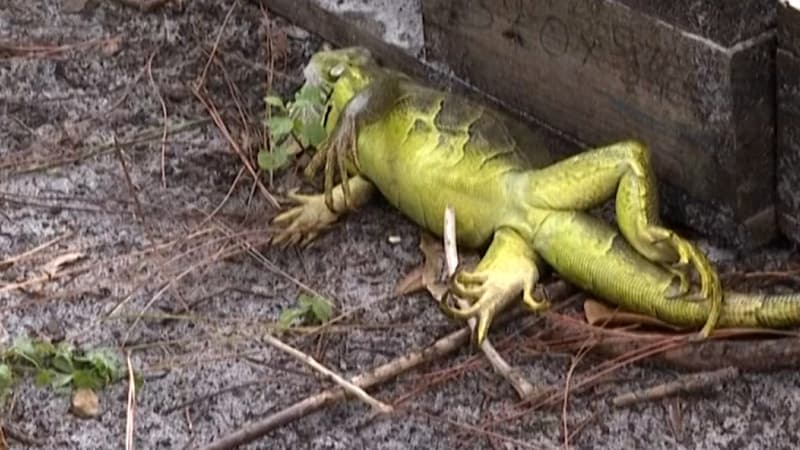In the United States, animals are falling from the sky. In connection with the polar storm that continues to paralyze the country after the death of at least 46 people, some wild animals are freezing and falling from the trees where they had taken refuge.
In Florida, inert iguanas have begun to be seen on the roads. the sunny state It is not spared from the drop in temperatures, where cold wind alerts have been issued for the Christmas weekend.
Central Florida was the coldest. Saturday and Sunday, -1°C was measured overnight in Orlando, while the average is normally around 15°C.
cold blooded animals
However, iguanas are cold-blooded animals. When the mercury drops below 10°C, they can freeze. Especially when the sun’s rays are scarce, making it almost impossible to maintain a normal body temperature.
“At night, without the heat provided by the sun’s rays, the iguanas plunge into a state of torpor, where it is impossible for them to move,” he explains to news week William Kern, reptile scientist and professor at the University of Florida.
In this situation, the reptiles lose their grip on the branches and fall onto the road, especially if the winds are strong. On social networks, many residents have shared images of inert iguanas, some do not hesitate to take them with their own hands.
inert but not dead
The sighting of frozen iguanas has become almost a winter tradition in the southern state of the United States. Similar drops were reported last January during a previous cold snap.
But the Florida Aquatic and Wildlife Commission warned residents on Facebook. Although frozen, iguanas are not dead. Once exposed to mild temperatures, they can come back to life and attack their benefactor.
“No matter what you do, absolutely do not bring wild green iguanas into your house or car to warm them up! They can recover faster than you think and become threatening, using their long tails and sharp teeth and claws.
William Kern recalls, however, in news week that although some animals come back to life, the drop in temperatures automatically translates into an increase in the mortality of reptiles.
“The most prominent episode dates from January 2010. We had a cold snap for a week. And some iguanas did not have time to warm up, ”he recalls in the magazine columns.
houston bats
Another species victim of the drop in temperatures on the other side of the Atlantic: bats. In Houston, Texas, many of these mammals have been observed on the roads, completely frozen. A worrying situation, while bats are important to local ecosystems: they feed on pests and mosquitoes.
In an attempt to save them, Mary Warwick, director of an animal shelter, regularly approaches the Waugh Bridge, a place known to harbor a colony of bats in the Texas metropolis, reports the daily mail.
With volunteers, he is dedicated to collecting the frozen animals. Once placed in shoe boxes, they are returned to specialized clinics. But with this new bout of cold, many fear that Houston, while known for its blistering temperatures, has become too unstable for bats. A situation that would push the animals to migrate further south.
Source: BFM TV


